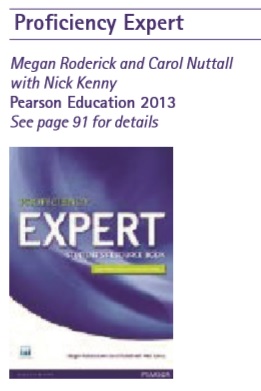A Book I’ve Used - Proficiency Expert
Proficiency Expert
Megan Roderick and Carol Nuttall with Nick Kenny
Pearson Education 2013
 Students who wish to score well in gate-keeping examinations need good exam-preparation materials to help them reach their goal. Proficiency Expert could be one of those that high-achieving students really need.
Students who wish to score well in gate-keeping examinations need good exam-preparation materials to help them reach their goal. Proficiency Expert could be one of those that high-achieving students really need.
The coursebook consists of ten topic- based units covering a broad sweep of content. Each module is divided into two sections (A and B) and focuses on the developing of language skills, language knowledge and the test- taking strategies required for coping successfully with the Cambridge English: Proficiency Examination (CPE).
Unlike most other examination- preparation material, this volume shows a shift away from product- orientation – emphasizing correct answers to test items – towards more process-orientation, aimed at equipping students with the necessary test-taking strategies to help them achieve their potential.
Most of the tasks in the book aim to develop the subskills tested in the exam – of listening, reading, speaking and writing – or are focused on an advanced area of linguistic knowledge.
Each module begins with a page of lead-in activities to activate the students’ background knowledge. This is followed in the A units by strategy- training activities for Reading, in which the students are given the opportunity to complete a task with strategy support and then, where possible, reflect on the process in a post-task activity. (These reflection tasks, labelled “Task Analysis”, are a feature of many of the skills sections.) Substantial vocabulary practice then extends out of the reading text and leads into a Use of English exam task. The rest of the unit consists of a Listening strategy task, language development activities linked to a Use of English paper and a Writing development task. The B units go from Listening to Speaking, Language Development to Use of English and a full process-approach to a Writing task. Each unit ends with a module review which provides additional exercises for the students to use their acquired lexical and grammatical knowledge in new contexts.
Writing is, from my own experience with students studying for CPE, really stressful, and a genre and process- based approach will help reduce anxiety. Each main task contains question analysis, genre-awareness, planning support, ideas for language (practised in mini-activities) as students are guided through a first draft to their final version.
The Exam Reference, Expert Grammar, Expert Writing and Expert Speaking sections at the end of the book are very helpful. The Exam Reference describes what is required in each part of the exam, as well as the task strategies needed for each. The Expert Grammar section explains and exemplifies, unit by unit, the areas of grammar practised, and this will help build up the students’ confidence. I particularly like the Expert Writing section. The first part explains the assessment criteria – how the Writing tasks are marked and graded – and offers a writing checklist to help develop the students’ editing skills. The second part contains model answers for each genre tested, with awareness-raising points and a Further Practice task. Then come two full pages of linking devices such as evaluating, expressing grades of agreement, and so on. The Expert Speaking section also includes a page of linking devices (starting off a conversation, sustaining, concluding and moving on, etc.).
Unfortunately, the book does not provide an answer key, so any student wishing to use it for self-study will need to access the Teacher’s Resource material online! However, this is a primarily a class book and as such concentrates more on process than on just getting answers right or wrong. I believe that once the students have mastered the appropriate strategies, they will be able to complete the tasks in the exam successfully.
Although I am not so naïve as to think that a coursebook on its own is enough to get students to master the skills necessary for CPE, Proficiency Expert provides a very firm basis and would be a wise choice.
Le Van Canh is a Senior Lecturer in Applied Linguistics and a Teacher Educator at the University of Languages and International Studies, Hanoi, Vietnam.
Comments
Write a Comment
Comment Submitted